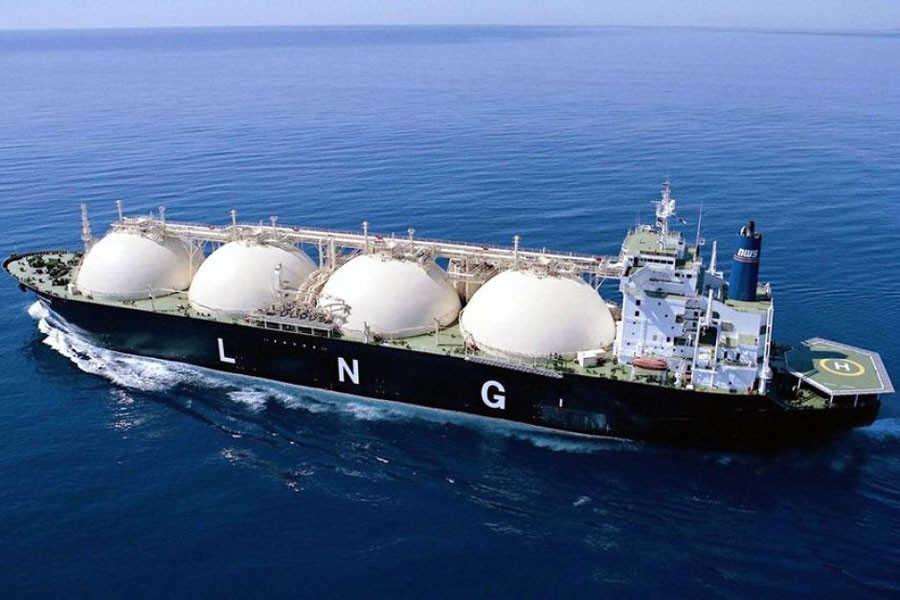Liquefied natural gas (LNG) prices will be 'affordable' and 'stable' in the medium term, prime minister's energy adviser assured the businesspeople to allay their worry about pricing of the upcoming new fuel.
"I assure you that the prices of LNG will be affordable and remain stable in the medium term," Dr. Towfiq-e-Elahi Chowdhury told a luncheon meeting organised Wednesday by a leading chamber, MCCI, Dhaka, where a barrage of questions cropped up over Bangladesh's energy scenarios.
The adviser said the import of LNG will begin early next year with 500 million cubic feet in the maiden consignment. The volume will be enhanced by another 500 million cft in the middle of the next year.
The imports of the alternative fuel, he added, will reduce the gap between demand and supply of gas in the country.
Dr Chowdhury was speaking as the chief guest at the third quarterly luncheon meeting of the Metropolitan Chamber of Commerce and Industry, Dhaka (MCCI).
Nihad Kabir, president of the MCCI, delivered the welcome address at the meet. The chamber's past presidents and city's business elites were present.
Dr Chowdhury, however, ruled out the possibility of open-pit coalmining in the northern part of Bangladesh because of its consequences for the fertile arable lands and other environmental implications.
The PM’s adviser said the government plans to focus on Moheshkhali to make it better than Singapore as there will be a deep-sea port, an energy hub and recreational zone on the offshore island of the Bay of Bengal.
He urged the businesses to opt for energy conservation and its efficient uses.
Dr Chowdhury further said another 60 megawatts of electricity will be imported from India and the imports will total 600 megawatts.
There is also a plan for importing 500mw hydropower from Nepal and Bhutan, he told his audience of businesspeople, who face staggering energy shortages and cannot execute their fresh business plans.
While delivering her speech, the MCCI president said the government had committed to meeting at least 30 per cent of the country's power demand from coal-based plants by 2030, and is relentlessly working towards setting up 22 coal-fired power plants over the next four years.
She also pointed out that the country aims to achieve a capacity of 24,000mw power generation by 2021 and eventually 40,000 mws by 2030.
The chamber chief, however, said three issues stir the mind of businesspeople in this context now: the availability of quality gas and electricity, stability, and predictability of the price of electricity and gas.
"When I speak of quality, what I mean to say is that gas is delivered but not at sufficient pressure or the contracted pressure," she said.
Likewise, electricity voltage is more often than not lower than the expected standards.
"Modern machinery cannot run effectively or in some cases at all under these circumstances," the MCCI president added.
She mentioned that processing industries are constrained to rely on captive generation.
"The price of gas and electricity has been increased manifold in the last several years, 6 times for the one and 7 for the other. Another increase has been proposed. The gains from the lower price of oil globally have generated profits for Petrobangla but have not been passed on to the consumers," she said.
The chamber leader said depletion of gas reserves is one of the biggest hurdles they are currently facing.
"There is no denying that we need to undertake major explorations of hydrocarbon, and the earlier we discover some, the better for us."
The dependence on coal-based plants for power generation has the catch that most of the coal will be imported, and shifting global coal prices can pose difficulties for the country.
"We would also have to be equipped with the proper infrastructure for importing huge amounts of coal and have an able managing team," she said.
The MCCI chief focused on another potential risk on the energy front. "We are planning to use LNG in vast quantities over the next decades. We have to remember that it is costly, and its introduction will lead to some price shock."
She said the government would need to prepare the public opinion and acceptability for that beforehand.
Similar questions of storage and transportation management arise in respect of LNG also.
"An important question is whether we will become over-dependent on imported sources of energy, such that any instability in that supply chain, and any rise in global prices will jeopardise our gains in this very important sector," she said.
The MCCI chief advocated that the increase in energy supply in the country can only be beneficially achieved if transmission capacities also increase at the same pace.
This has not always been the case so far, resulting in supply bottlenecks in important commercial corridors such as Chittagong and Comilla in the past. "We would need to focus on maintaining a balanced growth across all process levels," the chamber president said.
She noted using renewable energy sources is fundamental for energy diversification, but the lack of land impedes the implementation of solar projects.
"We believe that, in the coming years, the government would conduct extensive research in the areas of power system planning, grid stability analysis, waster heat recovery, energy efficiency and renewable system design and provide the country with an ideal energy-mix to face its ever-increasing consumption of energy."
Former MCCI president Syed Nasim Manzur delivered the vote of thanks in the meeting.
Its past presidents Tapan Chowdhury and Laila Rahman Kabir, president of Bangladesh Employers' Federation Kamran T Rahman, former president of Dhaka Chamber of Commerce and Industry Asif Ibrahim and chairman of the Association of Bankers, Bangladesh Limited Anis A. Khan were among other businesspeople present.


